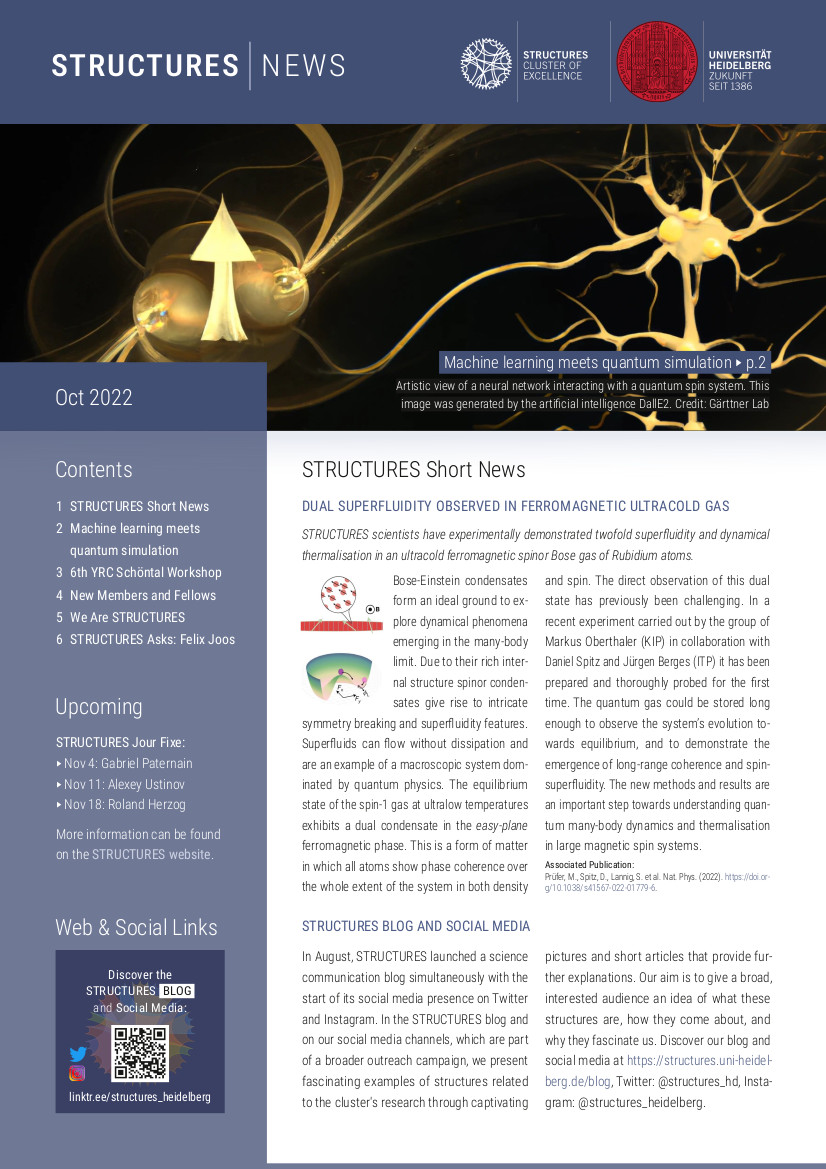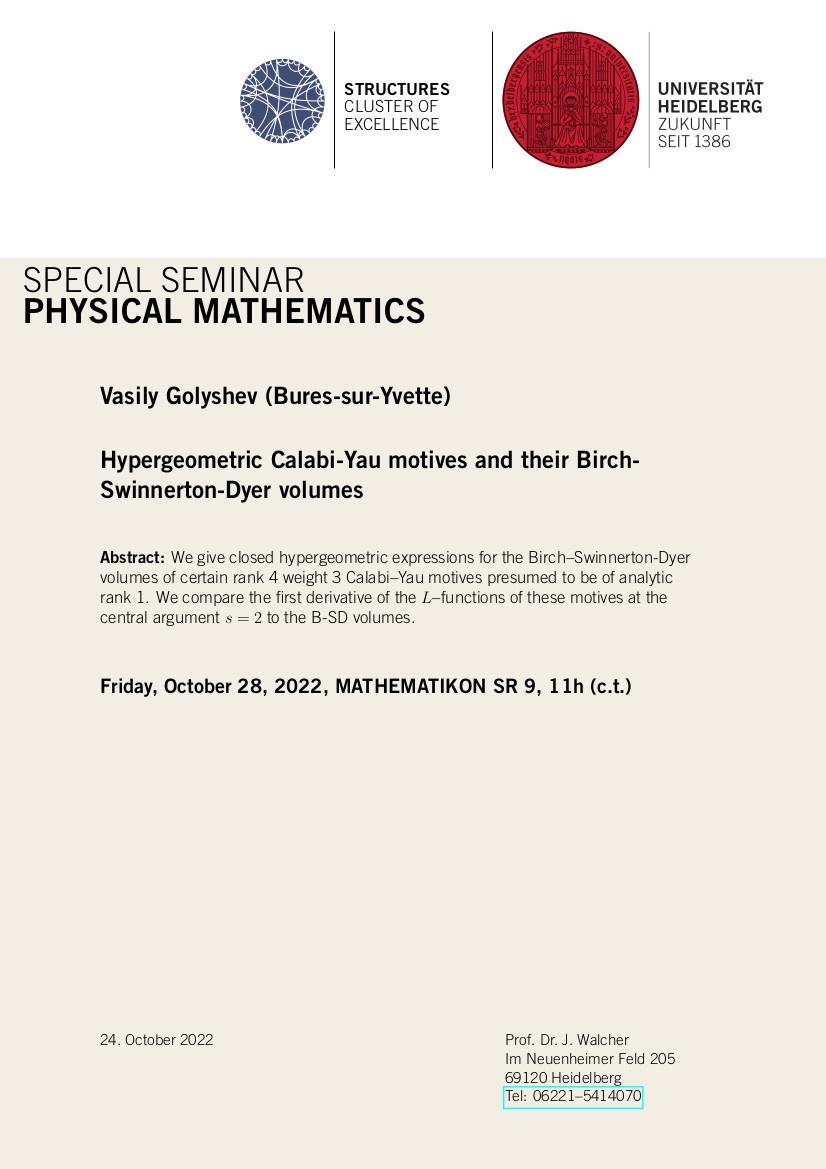Newsroom
Stay informed with our latest news and announcements on this page. For more in-depth content, we also encourage visitors to explore our bimonthly STRUCTURES Newsletter magazine, which features a variety of articles, interviews with members, and background information on our latest research and activities.
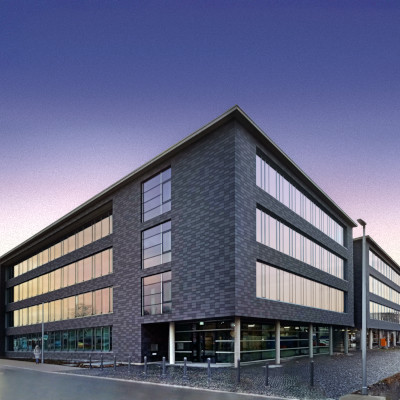
Heidelberg scientists will develop novel computing technologies at the European Institute for Neuromorphic Computing (EINC)
The new EINC building at Heidelberg University – an experimental hub for pioneering research on new computing technologies – is about to be officially inaugurated. The ceremony on 23 November 2022 will be hosted by the Mannheim and Heidelberg office of the state assets and construction company Vermögen und Bau Baden-Württemberg. Attending the event will be the state's Minister of Science and the Finance Minister, along with representatives of three donors who have secured the implementation of this innovative project with their financial support. The EINC will provide research and work areas for scientists from the Faculty of Physics and Astronomy, the STRUCTURES Cluster of Excellence and the new Faculty of Engineering Sciences, who are engaged in developing and establishing novel computer technologies and designs based on fundamental principles of physics. In cooperation between various disciplines, new hardware models are emerging with different technology platforms relying on high-end analogue electronics, modern integrated optics and highly controlled quantum systems.
A new podcast episode of “#exzellenterklaert - Spitzenforschung für alle” is online. The new episode deals with the subject “The Ocean Floor: Unexplored Interface of the Earth”. The ocean floor is a unique ecosystem. However, as of yet, only a small portion of it has been scientifically investigated. The difficulties related to accessibility necessitate ship expeditions and the use of highly specialized underwater equipment for its exploration. The Cluster of Excellence “The Ocean Floor – Earth’s Uncharted Interface” aims to initiate a new chapter in this field of research by quantifying exchange processes at this significant boundary layer and their roles in the Earth's ecosystem.
The German science podcast “Exzellent Erklärt - Spitzenforschung für alle” reflects the research diversity of Germany’s leading research institutions and Clusters of Excellence: from Antiquities to Quantum Physics. In each episode, listeners can expect insights into the interdisciplinary work of one research network.
Anna Wienhard, one of our speakers, has accepted an offer by the Max Planck society. As of November 1st, 2022, she is director at the Max Planck Institute for Mathematics in the Sciences, Leipzig. She will keep close ties with Heidelberg's research community and the Cluster of Excellence STRUCTURES. Congratulations, Anna, for obtaining this very prestigious position and all our best wishes for your work there! And thank you for all the great contributions you have made to our cluster!
We are happy to present the eighth volume of the STRUCTURES Newsletter featuring the following topics:
- STRUCTURES Short News Oct 2022:
- Dual Superfluidity Observed in Ferromagnetic Ultracold Gas
- STRUCTURES Blog and Social Media
- Research Update: Machine learning meets quantum simulation
- 6th YRC Schöntal Workshop on “Renormalisation and Effective Theories”
- New Members and Fellows
- We Are STRUCTURES
- STRUCTURES Asks: Felix Joos
The STRUCTURES Project Management Office is happy to answer questions and to receive feedback.
 The ERC Synergy Grants are awarded for collaborative research by the European Research Council.
The ERC Synergy Grants are awarded for collaborative research by the European Research Council.The European Research Council awards Prof Anna Marciniak-Czochra (IAM/BioQuant/IWR) and Jun-Prof Simon Anders (Bioquant/ZMBH) together with Dr Laure Bally-Cuif (Institut Pasteur, Paris) and Ana Martin-Villalba (DKFZ) the highly endowed ERC Synergy grant for a pioneering research project that focuses on interdisciplinary research into the dynamics and control of neural stem cells. Stem cells are human cells with the unique ability to develop various other types of cells with specialized functions. The project “PerPetuating Stemness: From single-cell analysis to mechanistic spatio-temporal models of neural stem cell dynamics” (PEPS) is going to investigate the ability of stem cells to renew themselves and to differentiate. The PEPS team will develop and combine experimental methods with data analysis and mathematical modelling in order to understand how neural stem cells guarantee the human brain's long-term function by constantly generating new neurons necessary for its plasticity and repair. This requires an interdisciplinary and multi-scale effort to clarify how to reconcile decisions taken at the single cell level and at the population level. The ERC is making available approximately eleven million euros for the PEPS project, with almost 3.8 million going to fund the work at Ruperto Carola. The ERC Synergy Grants fund collaborative projects that, due to their complexity, require methods and expertise of multiple groups in order to achieve breakthroughs that would not be possible in individual projects.
Further information:
Anna Marciniak-Czochra's Website
Simon Anders' Website
Press Release by the European Research Council
On Friday, October 28, 11:15 am, there will be a special Physical Mathematics seminar by Vasily Golyshev (Bures-sur-Yvette) on Hypergeometric Calabi-Yau Motives and their Birch-Swinnerton-Dyer Volumes:
Abstract: We give closed hypergeometric expressions for the Birch–Swinnerton-Dyer volumes of certain rank $4$ weight $3$ Calabi–Yau motives presumed to be of analytic rank $1$. We compare the first derivative of the $L$–functions of these motives at the central argument $s = 2$ to the B-SD volumes.
The talk will take place in Mathematikon, SR 9 at 11h (c.t.).
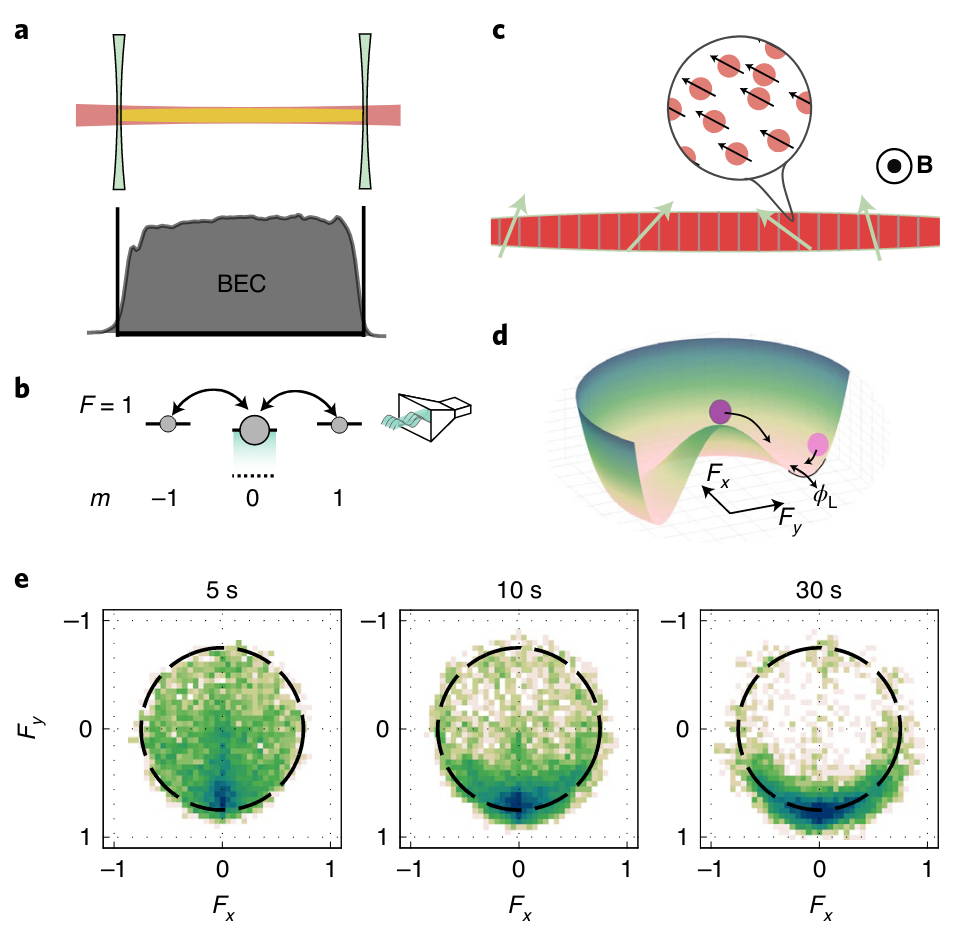 Homogeneous spinor Bose gas and easy-plane ferromagnetic properties. Reproduced from Prüfer, M., Spitz, D., Lannig, S. et al. (2022), Nature Physics, Fig. 1. For details about panels (a) to (e), please refer to the caption in this publication.
Homogeneous spinor Bose gas and easy-plane ferromagnetic properties. Reproduced from Prüfer, M., Spitz, D., Lannig, S. et al. (2022), Nature Physics, Fig. 1. For details about panels (a) to (e), please refer to the caption in this publication.STRUCTURES scientists have experimentally demonstrated twofold superfluidity and dynamical thermalization in an ultracold ferromagnetic spinor Bose gas of Rubidium atoms.
Bose-Einstein condensates form an ideal ground to explore dynamical phenomena emerging in the many-body limit. Due to their rich internal structure spinor condensates give rise to intricate symmetry breaking and superfluidity features. Superfluids can flow without dissipation and are an example of a macroscopic system dominated by quantum physics. The equilibrium state of the spin-1 gas at ultralow temperatures exhibits a dual condensate in the “easy-plane” ferromagnetic phase. This is a form of matter in which all atoms show phase coherence over the whole extent of the system in both density and spin. The direct observation of this dual state has previously been challenging due to access to only short timescales or limited experimental control. In a recent experiment carried out by the group of Markus Oberthaler at the Kirchhoff Institute for Physics (KIP) in collaboration with Daniel Spitz and Jürgen Berges from the Institute of Theoretical Physics (ITP) it has been prepared and thoroughly probed for the first time. The quantum gas could be stored long enough to observe the system’s evolution towards its equilibrium state, as well as to demonstrate the emergence of long-range coherence and spin-superfluidity. The new methods and results are an important step towards understanding quantum many-body dynamics and thermalization in large magnetic spin systems.
Link to the associated publication in Nature Physics:
Prüfer, M., Spitz, D., Lannig, S. et al. Condensation and thermalization of an easy-plane ferromagnet in a spinor Bose gas. Nat. Phys. (2022). https://doi.org/10.1038/s41567-022-01779-6.
